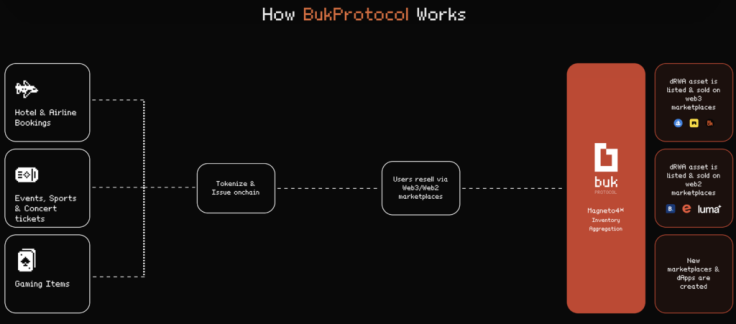Elastos Incorporates BukProtocol – Powering Travel With Tokenization Directly In Bitcoin

KEY POINTS
- BukProtocol tokenizes travel bookings and other agreements, covering all aspects of the travel experience
- BukProtocol's CEO said 'BeL2's potential to complete the entire tokenization process directly in Bitcoin' is compelling
- Elastos' Hargreaves praised how BukProtocol is demonstrating the various opportunities emerging from decentralization
Public blockchain project Elastos on Tuesday announced a strategic partnership with real world asset (RWA) dApp BukProtocol, enabling the extension of decentralization to the travel sector, directly in native Bitcoin.
The travel industry has long been plagued with issues that boil down to its unpredictable nature. Itineraries, schedules and routes are often subject to change at the last minute due to unforeseen incidents, and the consequences can be cost-inefficient for all stakeholders.
Tokenization, backed by the transparency of decentralization, enters the picture with the promise of making the travel experience much more meaningful. Tokenization, in the context of blockchain technology, has the potential to mitigate many of the problems faced by suppliers and travelers alike.
Elastos' BeL2 Protocol Meets BukProtocol
With BukProtocol, travel bookings and other agreements are tokenized, made into fully transferable "Dynamic Assets" that can subsequently be monitored, exchanged, or traded should travel be canceled, or a change occurs in the itinerary.
Tokenization practically covers all aspects of the travel experience, from travel accommodation to guides, local tourist spots, and hospitality.

Through the partnership, tokenization will be completed directly in native Bitcoin. The BeL2 (Bitcoin Elastos Layer 2) protocol's native Bitcoin function will maximize the integrity, security and liquidity of the process by facilitating the trade of agreements via Bitcoin-denominated Smart Contracts.
Bringing the Benefits of Decentralization to Travel
The BukProtocol system has onboarded over 2.2 million properties to date, including rooms from some of the travel industry's top brands, such as The Hilton Group, Wyndham Hotels & Resorts, and Marriott.
BukProtocol is used as a white label service that helps travel suppliers and agencies manage their bookings and inventories while subsequently allowing for trades across Web2 and Web3 marketplaces. With the Elastos BeL2 integration, BukProtocol sees its reach expanding to new audiences.
"While a presence within the Elastos ecosystem will certainly boost our visibility and reach, what's really compelling is BeL2's potential to complete the entire tokenization process directly in Bitcoin, a token that most of our audiences are familiar and comfortable with," Arul Prakesh, the founder and CEO of BukProtocol, said in a statement shared with International Business Times.
"Bitcoin denomination also maximizes the liquidity – and 'tradability' – of resulting assets; a crucial consideration for users," he added.
Tokenization for Better Travel Experiences
Elastos' Bel2 Protocol allows for the tokenization of any travel-related experience based on terms defined in a Bitcoin-assured Smart Contract. The protocol enables tokenization minus the complexities involved with bridging, wrapping, or otherwise interfering with the Bitcoin layer.
Aside from avoiding the issues that come with network congestion, the BeL2's processing system also helps avoid added fees, improving the experience for both suppliers, agents, and travelers.
"BeL2's unique zero-knowledge-proof process – ensuring complete interoperability while leaving the Bitcoin layer entirely untouched – means that Bitcoin's integrity is fully leveraged throughout the tokenization process," said Jonathan Hargreaves, Elastos' Global Head of Growth.
In practice, the tokenization process through BeL2 will allow travel community members to trade assets directly amongst each other, completely eliminating the need for intermediaries and inefficiencies that result from the traditional travel system.
"The BukProtocol is really demonstrating the practical – and exciting – opportunities that can emerge from decentralization; within a sector that's characterized by unpredictability and sub-optimized inventories," Hargreaves said.
© Copyright IBTimes 2024. All rights reserved.



















